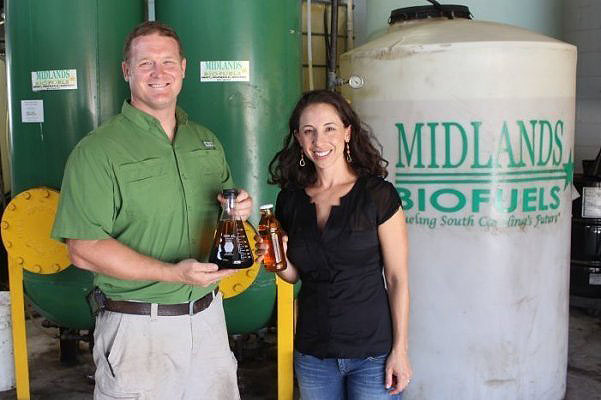2008Midlands Biofuels starts operations
2016Expansion to Tennessee, name change
2018The second plant in South Carolina starts operations
2020Composting facility purchased
2022Depackager starts operation
2022Three awards
The Green Energy Biofuel LLC Story:
BioJoe Renwick comes from a long line of entrepreneurs in Winnsboro, SC. Both his father and grandfather owned businesses in town. Joe’s first business was a landscaping business that he sold when he moved to North Augusta with his wife, Dr. Beth Renwick, who was completing her residency in emergency medicine. However, Joe kept his sturdy 2003 Chevy Diesel Pickup truck that he bought for the landscaping business which would later come in handy as he moved forward in his career path.
While living in North Augusta Joe worked at Wachovia Bank until the banking industry collapsed in 2007. Shortly after that, he found a job selling pharmaceutical drug manufacturing equipment – tanks, pumps, and valves. Joe acquired experience as a salesperson and gained a deep understanding of fluid process design. Unfortunately, the sole owner of the company passed away and Joe found himself unemployed.
Through extensive research and countless hours, Joe was able to produce his first batch of biodiesel in his garage! “Within a few weeks and a few hundred dollars, I was making fuel from waste cooking oil recycled from the local tapas restaurant ‘The Bee’s Knees’ in downtown Augusta,” – Joe explains. By the time Beth finished her residency, Joe had made eight batches of fuel. After testing the fuel in his own truck and seeing its success, he knew he was onto something big.
Joe and Beth moved back to Winnsboro after Beth completed her residency. Beth got a job at Lexington Medical Center’s Emergency Department, where she still practices today. “Upon our first night home, we had some old friends over we hadn’t seen in years. We discussed future plans for Joe and decided – biodiesel was the path forward,” – remembers Beth.
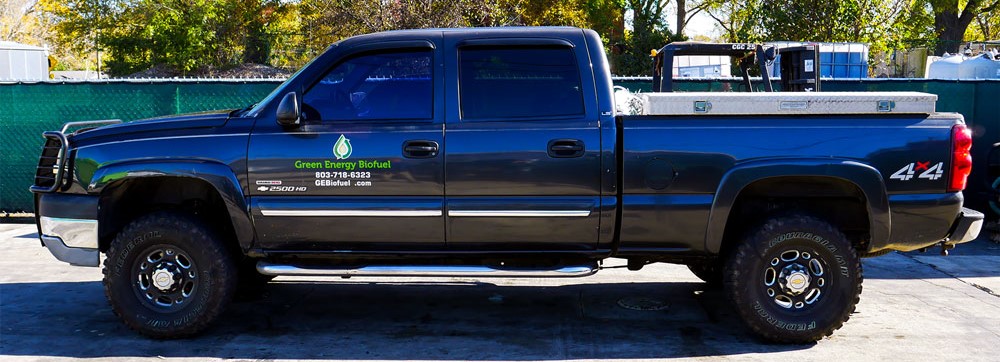
BioJoe Renwick and his first business partner and former Citadel football teammate, Brandon Spence, started Midlands Biofuels, LLC in 2008. Together they knew everything they needed to know to grow at an exponential rate with little funding. BioJoe understood the biodiesel process, and Brandon, as a Small Business Specialist at the Department of Commerce knew what to do to build the business from the bottom up.
BioJoe and Brandon quickly found about 80% of the biodiesel processing equipment they needed to get started. They used credit cards, and BioJoe even took out a loan against his diesel truck that started this adventure. The initial equipment purchased at that time is still used 10 years later in the Winnsboro plant.

BioJoe and Brandon were accepted in Midlands Technical College’s Accelerator Program. “We were accepted into the Business Accelerator Program and had a 15,000sq ft brand new facility outfitted with offices, reception area and parking. It was going to be the best place to start a business you had ever seen,” – shared BioJoe. Midlands Biofuels was also going to be the first to move in followed by a hydrogen fuel cell company next. “We were going to put this campus on the map for clean energy business start-ups!”
However, after meeting with the building and zoning departments for the area, they were shut down on the spot once the department representatives that they would store used cooking oil (UCO) collected from restaurants in unheated carbon steel tanks inside the building. “We didn’t even get to the part telling them we used methanol, with similar flammability as gasoline, to mix under heat with a strong caustic chemicals (think of Lye) to convert the oil into fuel and then distill the methanol back out of it like an alcohol still,” – laughs BioJoe, remembering that bumpy road.
The next week they drove around Winnsboro, the small town in which Bio Joe grew up and found an abandoned business on Main Street. They negotiated terms and moved in 3 days later. “Our whole process fit inside, and we had room to spare.” They qualified for a NASA “Rural Area Development Program” and were able to prove their process ideas for Boilerless Technology™ which they trademarked. This process heats biodiesel to over 230F degrees allowing them to recover over 94% of all methanol post the chemical reaction at 0.05% of traditional boiler cost. A traditional boiler, which is wildly dangerous and uses a highly regulated steam heating system. Their Boilerless Technology ™ worked, and subsequently, they ran the plant on it for 4 years using this heating system.
By this time, BioJoe and Brandon’s credit cards were maxed out, and BioJoe had worked for 14 months without pay. They needed real funding to get the business off the ground. With the business plan created to get into the Midlands Technical College Accelerator Program, they applied for a loan with First Citizens Bank. They got a loan for $140k against the value of the equipment that they had acquired which was about $27k. “The day the loan closed the stock market crashed. We were there before the bank opened and signed the document before the word hit the street. Just after we inked the loan agreement, a phone call was received to tell the branch not to offer us the loan, but it was too late! Early bird gets the worm.” Starting a business within the US in the throes of a depression and in an industry that had only been started 2 years prior while competing against BP, Shell, Exxon, and other companies that had run unopposed since their inception was a bit of an uphill battle for a small company in Winnsboro, SC to say the least.
“There was not ONE DAY that it was easy for us to push forward against literally all odds.” Just a year later, in 2009, the U.S. Government cut all biodiesel production subsidies, and the $1 per gallon for each gallon of biodiesel produced was lost. All 7 fully operational biodiesel plants in SC went bankrupt and shut down. Midlands Biofuels has been the only company to weather the storm that was to come for the next 2 years. “We didn’t know if we had made the best idea or worst idea to start this biofuel company. But, we had never failed at anything before and had been taught that perseverance and discipline pay off in the long run from our time at The Citadel, and so we kept plugging away.”
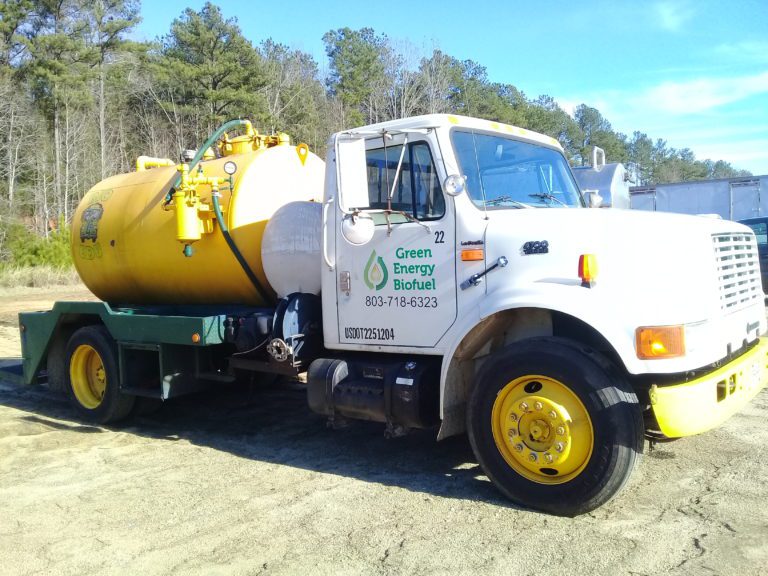
Before they knew it, BioJoe and Brandon were selling more fuel then they could make from collecting oil themselves and were in need of making another sales effort to gain more customers. BioJoe would go out in his truck and make sales calls and collect oil at the same time every day until enough oil was collected to do another 3,000 gallons production run for biodiesel. Production runs occurred about every 30 days since most accounts only make less than 100 gallons per month.
That was the summer of school contracts and internships. They started the company’s first Green Entrepreneur program with The Citadel and chose Tyler Reid, who had the gift of gab, as the first intern. “We gave him a list of SC schools, and he signed up 7 school districts in 2 months. We then had him start going to recycling centers, too. This quickly built a base of customers which spread across SC. We still have an active internship with The Citadel, Clemson, and USC.” – comments BioJoe.
The company received funding from the Department of Energy (infrastructure grant “Clean Cities”), DHEC (DERA – Diesel Emissions Reduction Act Grant), and the State of South Carolina (SC Launch Grant). All of this financial support helped the company to grow, move forward, and become more efficient. Midlands Biofuels was able to purchase a biodiesel/petrodiesel blending skid to load tankers with biodiesel, a proper collection truck to service its growing list of customers and twenty 300 gallon metal Baker Waste Equipment collection bins, as well as provide the salary for a collections driver. BioJoe would now be able to make fuel faster since a collection truck could collect more per day without spills and more importantly, would enable BioJoe’s truck to be used for other tasks.
This was key to the company’s growth because it allowed BioJoe to spend his time on sales while someone else was collecting the cooking oil. Fuel production is no easy task requiring many gallons of used cooking oil, so it was huge for BioJoe to be able to focus on sales to bring in needed oil for production.
After two years of hard work, Midlands Biofuels was operating successfully. Brandon Spence, BioJoe’s partner, was able to leave his job with the DOC and come on full time at the company. Less than 2 months later, the largest food distributor in the U.S. came knocking on the door. They toured the plant, US Foods asked the company to build an oil processing plant exclusively for them.
Three months later, they had built a second plant, with BioJoe running the first and his partner, Brandon, running the second. “We impressed US Foods so much we were given first right of refusal to build 2-4 additional plants every quarter for 3 years to cover the US with small-scale biofuel production plants that ran off the cooking oil recycled from the clients of US Foods’. It was going to be beautiful.” – recalls BioJoe.
However, in 2011, BioJoe and his partner decided to split ways, making BioJoe the sole proprietor of the plant in Winnsboro! A few years later, the biodiesel industry took a downturn, and unfortunately, the US Foods contract was canceled early, forcing the plant, like many in the industry, to shut down. Subsequently, BioJoe purchased that plant’s equipment and used it to outfit his own plant for the next scale of growth.
While searching for a new company partner, BioJoe was able to maintain the business through the support of Dr. Beth Renwick. In between hospital shifts, Beth was helping BioJoe with all sorts of tasks. Eventually, they realized that BioJoe had the perfect partner all along, and in 2012, Beth officially joined Midlands Biofuels and became the majority owner, making this company the only woman-owned biodiesel company in the U.S! The gloves came off at this point, and the two of them reworked the entire business. Changing the company from just an oil recycler/biodiesel company to a large-scale waste processor of products coming from the biodiesel industry itself.
At this point, BioJoe was simply trying to solve a wastewater problem for his plant and discovered a way to solve the same problem at every plant from which he could afford to haul waste. He partnered with every biodiesel plant in GA, SC, TN, and VA as well as any waste cooking oil collectors he could find. Hauling all of their waste to one location for processing gave them enough volume to create a completely new secondary waste process. This proprietary process was not commonplace in the market and was able to stabilize the company during very uncertain times in the biodiesel industry.
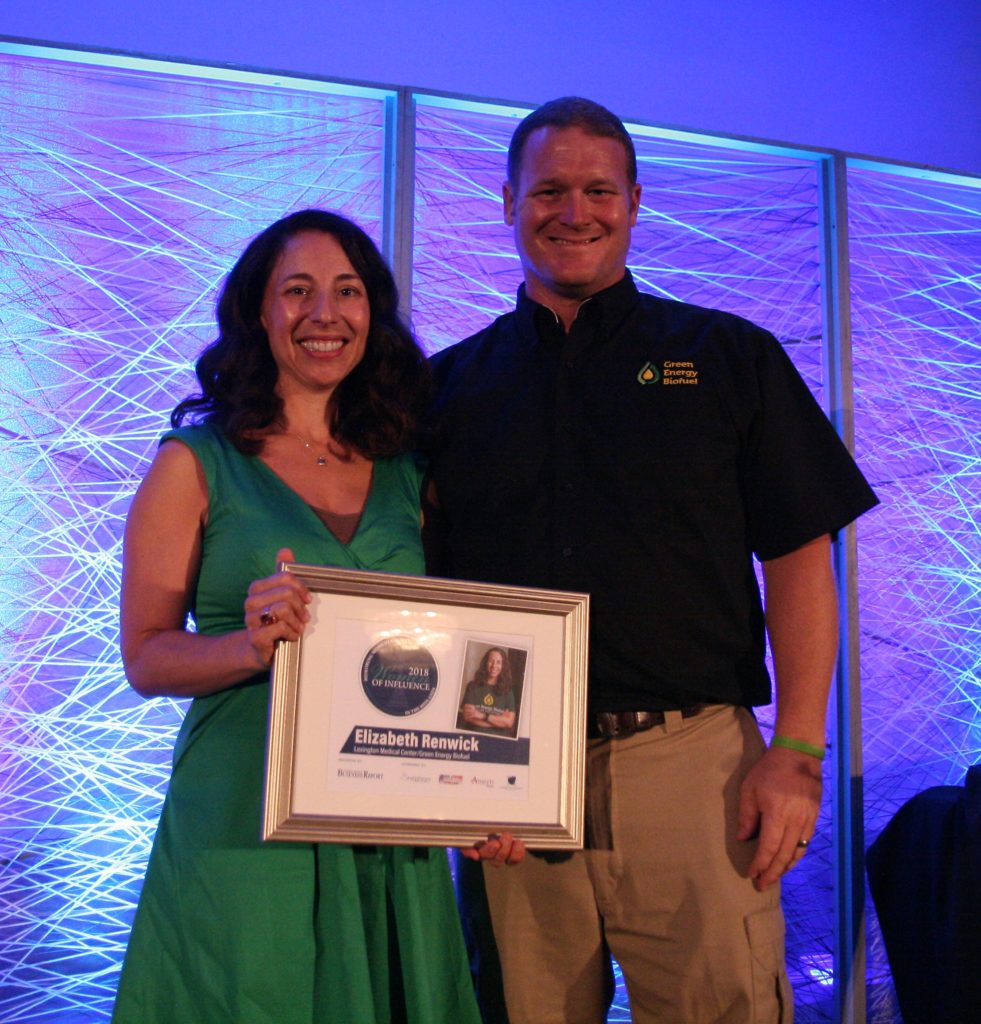
Finding alternative revenue streams and unique ways to position the business for growth has always been a strength of BioJoe. But, the support, given to him from his staff and partner Beth Renwick, has gotten him to where he is today. “I learned early on that I had to become a constant student and learn from not just our mistakes but the specific mistakes of others and learn how to modify the inputs to prevent my own mistakes. Becoming a service provider to other companies that share the same vision as you felt better than competing against the big fuel companies in the market. But helping cut waste disposal costs by as much as half and being able to sell product back to the same people we were hauling the waste from worked out quite well. This took our focus off of just biodiesel production and on to feedstock and waste processing.” – shares BioJoe.
Due to the floundering biodiesel industry in America, they qualified for a lay off aversion grant that allowed them to work with SC MEP to evaluate the business and to identify new markets, and new products, as well as to hire the biodiesel CPA/strategic planning company ‘Blue Wing’. “Through our combined efforts, we were able to refocus the direction of our company and make the hard decision to stay the course and potentially fail or strike out on a new plant and hope for the best.” This leap of faith was very well planned, researched and executed. A new process design was carried out and profits and growth were regained allowing the company a second wind and a new business model for exponential growth. “The first year, we grew revenue two times the previous year and have nearly doubled every year since. There isn’t a company in the biodiesel industry that doesn’t have unique waste disposal needs that we haven’t built our business around to in order to process it.”

While being a for-profit company, BioJoe and Beth’s goals have been and will always be – sustainability and social responsibility. They also strongly believe in the importance of education and are proud of two programs they have put in place. Working with colleges and universities, BioJoe continuously searches for interns to teach about the process with the hope of hiring these interns upon their graduation to fill roles in the growing company. Over the years, more than 100 internships have been given to these institutions of higher learning.
The second program is called Bio4Edu, which aims to support local schools by supporting their bus fleet, making donations to schools and school projects, and providing students with educational opportunities about the importance of environmental sustainability. In 2013, the company was named the SC Outstanding Business of the Year for environmental stewardship. In 2015, the company was named the SC Business of the Year by the SC School Board of Education for its good work, and in 2018, this program was named as a finalist in the Carolinas Green Sustainable Business Awards.
In 2016, Midlands Biofuels expanded its business area to the state of Tennessee by purchasing another oil processing plant in Knoxville, thus expanding its operations outside of the South Carolina Midland’s area. With this growth came the decision to change to the company name to Green Energy Biofuel. “Although we are proud of our “Midlands” roots, we decided to re-brand ourselves as Green Energy Biofuel LLC in 2016 because the new name is not geographically limiting and represents our growth as a company.” – shares BioJoe.
A lot of things have happened in the company since the rebranding. In two short years, Green Energy Biofuel has quadrupled in size with numerous new employees and improved processing capabilities in both – Winnsboro and Knoxville. Although these steps were great achievements, they were not enough!
In the summer of 2018, a third processing plant was purchased just outside of Aiken SC. The new plant will be able to process 60 million gallons of used cooking oil a year, employ up to 40 local people, and generate hundreds of thousands of dollars in taxes for the local community. That plant has a rail spur just below one of the largest and well-manned switching yards in the area giving that location 40% savings in shipping costs and up to 25,000 gallons per load over the railroad versus getting only 6,200 gallons per tractor-trailer tanker over the highway. With customers already in OH, PA, VA, LA, and Europe – the potential for growth is unlimited in terms of where the company can go. Being able to process 200,000 gallons of product each day will make this plant the largest of its kind in the U.S.!
The growth of the company meant that the amount of organic food waste and water removed during the production process increased. To solve GEB’s waste problem we started looking into different options and stumbled upon composting. When an opportunity to purchase ReSoil came along it was an easy decision to make. One year later Green Energy Biofuel is land-fill free and still growing. Since taking over operations we have composted over 17,000,000 pounds of waste.

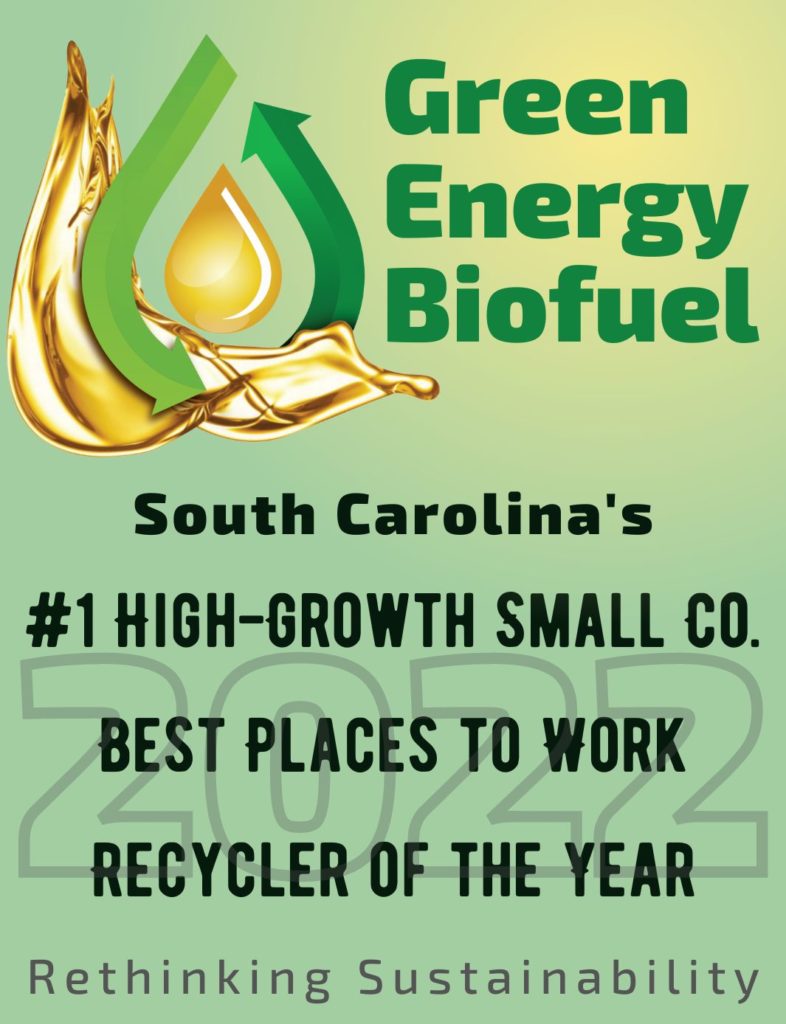
2022 has been a great year for Green Energy Biofuel. The company has been recognized by Carolina Recycling Association as Recycler of the year, voted by employees as one of the Best Places to Work in South Carolina, and become #1 Fastest Growing Small Company in the state. To top all of that the depackaging equipment started operation and allows us to help others on their journey to become zero-waste. Green Energy Biofuel now helps some of the largest food companies in the US to divert their wastes from landfills to compost the organics while also recycling all the packaging that comes with it too.
From its humble beginnings, Green Energy Biofuel is extremely proud to stand where it does today. With its growing operations and staff, the sky is truly the limit.

